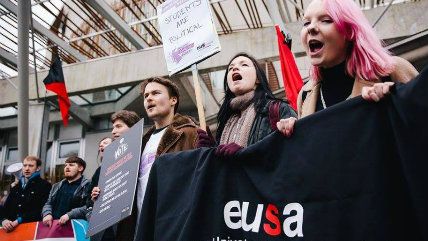Raised Hands Violate University Safe-Space Policy
And no shaking your damn head, either!

If you think that the sex and speech climate at U.S. universities has gone awry, U.K. college campuses are becoming downright dystopian. Remember last year, when British student leaders declared clapping too triggering and requested that students show approval with jazz hands instead? Now students have moved on to tackling another menacing movement: the raised hand.
Granted, raising one's hand has long been the universal symbol of "I have a question," especially in educational environments. But sometimes hand-raising can denote disagreement with a speakers' position, or even exasperation, and that's where we get into dangerous territory, say University of Edinburgh students. The move could be viewed as disrepsectful—and thus a violation of the school's "safe space" policy.
Last week Imogen Wilson, vice president for academic affairs with the student association, was threatened with removal from her position after she "raised [her] arms in disagreement" during a council debate and shook her head disapprovingly.
There has been a safe space complaint against @eusavpaa for inappropriate hand gestures. #eduni
— Student Newspaper (@TheStudentPaper) March 31, 2016
The Edinburgh Student's Association safe-space policy says student association members must treat each other with consideration and respect, and this is defined as "refraining from hand gestures which denote disagreement or in any other way indicating disagreement with a point or points being made. Disagreements should only be evident through the normal course of debate."
Proposer: I can see @eusavpaa making a negative head motion again #eduni
— Student Newspaper (@TheStudentPaper) March 31, 2016
Wilson will remain in her position, after a student council vote on her removal broke in her favor, 33 to 18.
On Twitter, Wilson wished that people would stop focusing on the safe-space debacle at the Student's Association meeting and more on the association's debate over issues related to Israel and Palestine.
Maybe people should be less concerned with my arm movements and more concerned that EUSA just passed policy to support BDS.
— Imo Wilson EUSA VPAA (@eusavpaa) April 1, 2016
Wilson also complained that her story is being used to mock safe-space policies—which are actually formalized guidelines at many U.K. schools, not simply rooms full of bubbles—in general, instead of seen as a singularly overzealous application of the policy. "I completely understand the importance of our safe space policy, and will defend it to the ground," she told HuffPost UK, "but I did not think that was fair, and had it gone further I would have either left or argued against it."
But other Edinburgh students say that this isn't some isolated incident, and the safe space policy, as written, is inherently problematic. Following the tense student association meeting, Charlie Peters, a first-year Edinburgh student who had been in attendance, created a petition to overhaul the school's safe space policy. "In a free and liberal society such as ours, it is imperative that people remain able to express their views, regardless of what others may think of them," it states. "This is currently not possible at the University of Edinburgh."
"The more ideas we challenge and discuss in public, the likelier we are to arrive at a moral and serious truth," Peters continued Peters. "I believe an institution which upholds the principles of free speech and diversity is superior to a Students' Association that patronises its own students by insinuating that they cannot handle opinions that differ from their own. We are adults, we do not need condescension or safeguarding. EUSA does their students a huge disservice by engaging in this malpractice."


Show Comments (178)